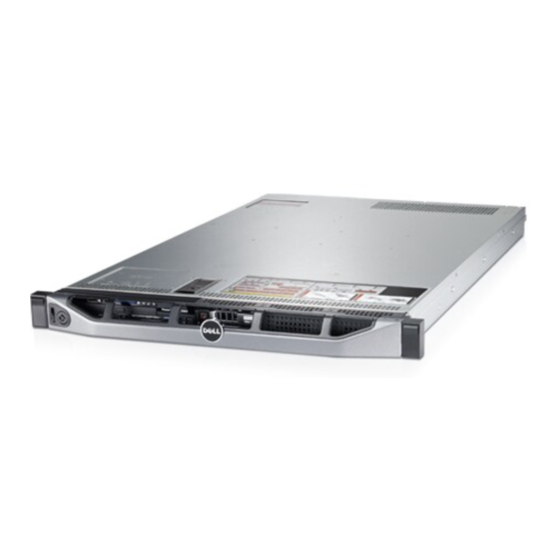
Dell PowerVault NX3300 Setting Up
Network attached storage system
Hide thumbs
Also See for PowerVault NX3300:
- Owner's manual (123 pages) ,
- Getting started manual (9 pages) ,
- Setting up (2 pages)
Advertisement
Quick Links
Setting Up Your Dell PowerVault NX3300 Network Attached Storage System
|
1
Before You Begin
WARNING: Before you set up and operate your Dell PowerVault system, review
the safety instructions that shipped with your system.
Dell Software License Agreement
•
Before using your system, please read the Dell Software License
Agreement that came with the system.
•
You must consider any media of Dell installed software as BACKUP for
the software installed on your system's hard-disk drive.
•
If you do not accept the terms of the agreement, call the customer
assistance telephone number. For customers in the United States, call
800-WWW-DELL (800-999-3355). For customers outside the United
States, visit dell.com/support and select your country or region from
the page.
Documentation
For documentation and information updates, see dell.com/support/
manuals.
|
2
Cabling the System Using iSCSI
Network Cabling
SAN switches
CIFS/NFS
External iSCSI (directly
NOTE:
This fi gure is an example of cabling the PowerVault NX3300 NAS system
connected to MD array)
with the MD3
storage array. To connect other Dell storage arrays to the
XXX
PowerVault NX3300 NAS system, see the documentation for the storage array.
Verifying Package Contents
Verify that all components listed on your packing slip are available.
Save all documentation and accessories.
Installing the System in a Rack
This system requires a properly grounded electrical outlet, a compatible rack,
and a rack installation kit. For more information, see the section
Information.
Check for documentation and information updates on dell.com/support/manuals.
Always read the updates fi rst because they often supersede information in other documents.
Client switches
Dell PowerVault NX3300 Controller 0
Dell PowerVault NX3300 Controller 1
Storage array
Active directory server
connected to the network
Locating Your System's Service Tag
•
Your system is identified by a unique Express Service Code and Service Tag
number. The Express Service Code and Service Tag are found on the front
of the system by pulling out the information tag.
•
This information is used by Dell to route support calls to the appropriate
personnel.
NOTE:
The illustrations in this document are not intended to represent a specifi c NAS
Additional
system.
|
3
Powering-Up and Managing Your NAS System
Power-Up Procedure
You must fi rst turn on the storage arrays and additional expansion enclosure(s), if any. After the storage arrays and enclosure(s) are initialized, turn on
the PowerVault NX3300 NAS system.
Managing Your NAS
To manage your NAS locally, connect a keyboard, monitor, and mouse directly to the NAS system.
To manage your NAS remotely, you can use:
•
Remote Desktop
NOTE:
For more information on Remote Desktop, see the section
•
iDRAC
For information about initial setup, configuration, and console redirection using iDRAC, see the Integrated Dell Remote Access Controller 7 User's Guide
NOTE:
at dell.com/openmanagemanuals.
Default Password
The default password for the NAS system is
Stor@ge!
Default System Name
Your system is configured with a default system name of D<ServiceTag>,
where
<ServiceTag>
is the Service Tag number located on the system
Locating Your System's
To locate the Service Tag of your system, see the section
Service Tag
in this document.
Launching the Remote Desktop
.
.
Advertisement

Summary of Contents for Dell PowerVault NX3300
- Page 1 For more information on Remote Desktop, see the section Storage array • iDRAC For information about initial setup, configuration, and console redirection using iDRAC, see the Integrated Dell Remote Access Controller 7 User’s Guide NOTE: at dell.com/openmanagemanuals. External iSCSI (directly...
- Page 2 Enable Remote Desktop using Server Manager or system properties (Control Panel -> System). If you have any feedback for this document, write to documentation_feedback@dell.com. Alternatively, you can use the Feedback link at the top left corner of your documentation web page.












Need help?
Do you have a question about the PowerVault NX3300 and is the answer not in the manual?
Questions and answers